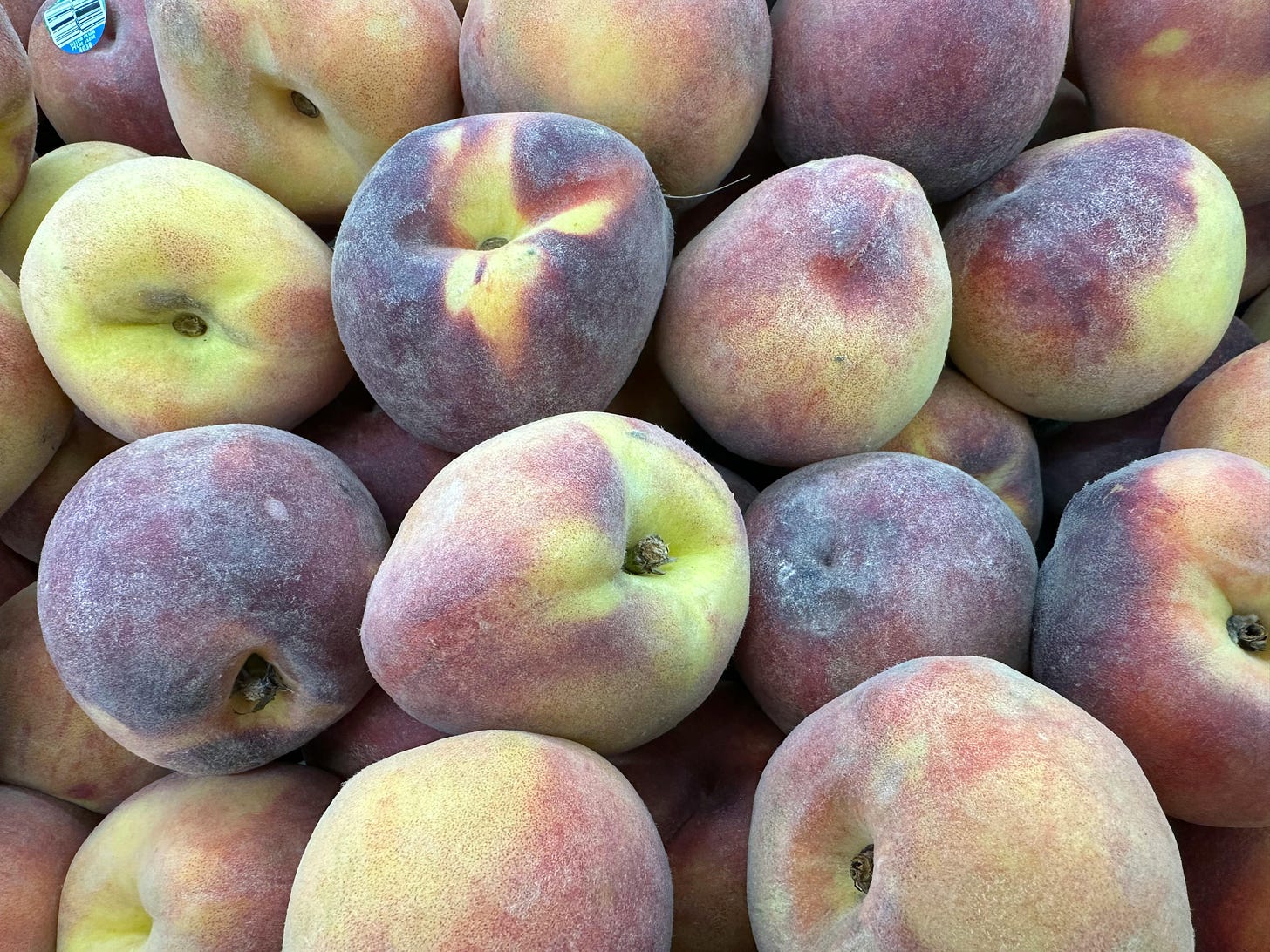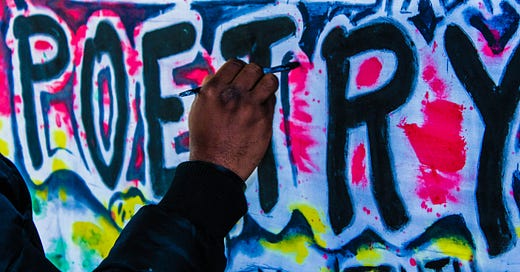Is It Wrong to Look away from Suffering?
Numbed by news of the world, poet Jack Gilbert cooks peaches
Welcome, newcomers and old friends. If you are new here, I’m Tara-with-an-ah, the sound you make in a choir or the dentist’s chair. The last month or so of posts at Quiet Reading have led me to see that my mission here — at least for now — is to “boost confidence in humanity” with the help of authors, books, and literary history. Given the dreadful state of affairs in Ukraine and Gaza and elsewhere in the world right now, how’s that for a tall order?
For the last few weeks, we’ve been busy boosting the confidence of writers by calling up companionable figures and genre lessons from the past (“People Still Buy Their Books”; “Newsletters and LitLetters”), and boosting the confidence of adults in the kids of Gen Alpha with a humorous story (“Duckling Rescue”).
This week, inspired by a commencement speech of President Joe Biden yesterday, we’re going to see if this boost-of-confidence-business has any muscle when we look at real calamities, like the horrid wars in Ukraine and Gaza.
As reported in
’s yesterday, President Biden spoke right to the issue that troubles many of us: what are we to do with death and cruelty and senseless loss, when things look hopeless? This is a very good question for a writer who fancies boosting anyone’s confidence in our species.To answer, I want to read a poem with you, called “Peaches,” by Jack Gilbert (1925-2012). The 15-line poem begins in calamity (“The ship goes down and everybody is lost”), when a character (“he”) finds himself alone on a beach. It’s possible that everyone on the ship is “living comfortably in Spain”; “he” doesn’t know. The whole poem takes place in the moment of his aloneness and his uncertainty about how bad things are elsewhere. The rest is remembrance. Standing on the beach, he has a strange, non sequitur memory of gray, flavorless peaches that at some time past he tried to cook into jam. He scorched them and ate the “mess,” “not sure whether he liked it or not. And never able to find any of them [the peaches] since.”1
I’ll print the whole poem at the end of this post. First, we’ll highlight a few key passages in dialogue with President Biden’s speech, to see how both speakers answer the difficult and timeless questions: How do I act? What is my responsibility while tragedy is happening somewhere that I am not? Is it inhuman to look away?

I. Keeping faith in Sunday
As Professor Richardson reported, President Biden framed these questions at the historically Baptist Morehead College, as the problem faced by Christ’s disciples on Saturday between the death of their leader on Friday and his Easter Sunday resurrection. Biden stressed,
[W]e don’t talk enough about Saturday, when… [Christ’s] disciples felt all hope was lost. In our lives and the lives of the nation, we have those Saturdays—to bear witness the day before glory, seeing people’s pain and not looking away.
Focused on action, Biden asked, “[W]hat work is done on Saturday to move pain to purpose?” In Richardson’s detailed account, the president proceeded to discuss actions he had taken for Civil Rights during times of past calamity, and actions his administration has taken recently on behalf of Black men and working Americans. He discussed his administration’s ongoing negotiations for a ceasefire in Gaza and a lasting two-state peace between Palestine and Israel.
The action he left to the graduates at Morehead College was more obscure, since each graduate of the all-male school will make his own choices. Biden encouraged his listeners to have at least this much in common:
Being a man is about the strength of respect and dignity. … It’s about giving hate no safe harbor and leaving no one behind and defending freedoms. It’s about standing up to the abuse of power, whether physical, economic, or psychological.
Evoking principles of the Civil Rights movement, the president encouraged persistent “faith” in what Americans could accomplish together by “giving hate no safe harbor and leaving no one behind.” If his listeners were to follow his example, they would fill their faithful Saturday with Sunday-oriented action.
II. Remembering peaches
Poet Jack Gilbert had an altogether different approach to the work of the person standing on the beach, filled with a sense of awful things happening somewhere. I want to propose that both Biden and Gilbert are right about what humans can accomplish; and that when we lack the clarity to look at suffering and act with faith and dignity, there is also a dignified option to look away. In Gilbert’s poem, looking away from suffering is not avoidance; it turns out there is no avoiding the universal conditions of loss and mortality. But that’s not to say we have to give suffering our attention at every moment.
With a ship (maybe) gone down somewhere, the man in Gilbert’s poem is not untouched by tragedy. “He finds himself at the edge / of emptiness, absence and heat everywhere.” In the poem’s pivot between the empty present and the remembered past, there is a strange metaphor: “He has listened to the song so often that he hears / only the spaces between the notes. He stands there, / remembering peaches.”
The poem gives us few clues about what this figurative “song” is. We can only suppose it’s a metaphor for the entire condition of the opening lines. In that case, we understand that this man has heard the song of tragedy, uncertainty, and loneliness so many times that this time, he hears the space between the notes. His attention slides from alarming things (the “notes”) — like the lost ship or lack of companions — to a neutral memory (the “spaces”), neither good nor bad. The only clear truth in the memory is that he has not found the gray peaches since the time he tried and failed make jam.
The peach memory is locked in time, mortal and unrepeated.
The present moment of loneliness on the beach will also, eventually, be locked in time, unrepeated.
When a person has experienced enough Friday calamities, says the poem when I read Biden’s Easter metaphor into it, sometimes on Saturday, the mind turns its attention, unbidden, to an altogether unrelated object — not to escape universal suffering (which is impossible), but simply to fill the space of Saturday because Saturday must be filled.
In this way, people who have experienced trauma may take years before they can remember what occurred. Between them, the president and poet say there is dignity in action to alleviate suffering — when it’s within our power — and dignity in allowing our attention to settle on ephemeral details closer to home.
Whether we look toward the trouble or away, the only thing not to do on this figurative Saturday is amplify rage and hate.
If we are making peace with our Saturdays, looking toward trouble or away, we can take confidence that we are doing what it’s in our human power to do.

“Peaches,” by Jack Gilbert
The ship goes down and everybody is lost, or is living comfortably in Spain. He finds himself at the edge of emptiness, absence and heat everywhere. Just shacks along the beach and nobody in them. He has listened to the song so often that he hears only the spaces between the notes. He stands there, remembering peaches. A strange, almost gray kind that had little taste when he got them home, and that little not much good. But there had to be a reason why people bought them. So he decided to make jam. When he smelled the scorching, they were already tar. Scraped out the mess and was glad to have it over. Found himself licking the crust on the spoon. Next day he had eaten the rest, still not sure whether he liked it or not. And never able to find any of them since.
Coming up
Next week: Children’s book author and illustrator Beatrix Potter had an early calamity. Read about a novelized account of what came next, The Tale of Hill Top Farm, by Susan Wittig Albert.
June 13: If you write on Substack and the Canadian author Alice Munro means something to you, consider posting something in her honor one month after her death as part of a virtual Substack memorial. See details here.
Jack Gilbert, “Peaches,” The Great Fires: Poems, 1982-1992 (Knopf, 1997), p. 57. In a darker reading of this poem than the one I’m proposing here, “them” in the last line can also refer to the people gone missing on the ship in line one. Thus, “he” never sees the gray peaches or the lost people again. This challenging poem has much to say beyond the reading I’m proposing here, but that’s conversation matter for another time.
















Thanks for this essay Tara. I’m a big believer in knowing what you can and cannot affect. Essentially the Serenity Prayer.
So in addition to avoiding hate I think we do have a responsibility to use what energy and resources we have to help others.
So if you cannot affect the course of a war I say it IS better to look toward opportunities where you can make a difference and know it is a positive one.
My knowing details of what’s going on in Ukraine and Gaza and Sudan does nothing positive.
Beautiful poem. Thx for sharing.
I don't look away but I cannot stare. I want to honor my people massacred on Oct. 7 and those still in captivity. Unfortunately, I cannot avoid the hate towards me personally, around the world, because I am Jewish.